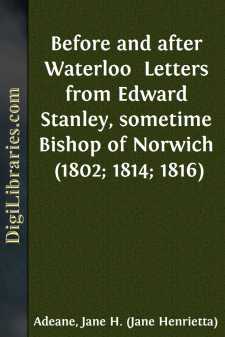Categories
- Antiques & Collectibles 13
- Architecture 36
- Art 48
- Bibles 22
- Biography & Autobiography 813
- Body, Mind & Spirit 142
- Business & Economics 28
- Children's Books 17
- Children's Fiction 14
- Computers 4
- Cooking 94
- Crafts & Hobbies 4
- Drama 346
- Education 46
- Family & Relationships 57
- Fiction 11829
- Games 19
- Gardening 17
- Health & Fitness 34
- History 1377
- House & Home 1
- Humor 147
- Juvenile Fiction 1873
- Juvenile Nonfiction 202
- Language Arts & Disciplines 88
- Law 16
- Literary Collections 686
- Literary Criticism 179
- Mathematics 13
- Medical 41
- Music 40
- Nature 179
- Non-Classifiable 1768
- Performing Arts 7
- Periodicals 1453
- Philosophy 64
- Photography 2
- Poetry 896
- Political Science 203
- Psychology 42
- Reference 154
- Religion 513
- Science 126
- Self-Help 84
- Social Science 81
- Sports & Recreation 34
- Study Aids 3
- Technology & Engineering 59
- Transportation 23
- Travel 463
- True Crime 29
Before and after Waterloo Letters from Edward Stanley, sometime Bishop of Norwich (1802; 1814; 1816)
Description:
Excerpt
BIOGRAPHICAL SKETCH OF EDWARD STANLEY
THE letters which are collected in this volume were written from abroad during the opening years of the nineteenth century, at three different periods: after the Peace of Amiens in 1802 and 1803, after the Peace of Paris in 1814, and in the year following Waterloo, June, 1816.
The writer, Edward Stanley, was for thirty-three years an active country clergyman, and for twelve years more a no less active bishop, at a time when such activity was uncommon, though not so rare as is sometimes now supposed.
Although a member of one of the oldest Cheshire families, he did not share the opinions of his county neighbours on public questions, and his voice was fearlessly raised on behalf of causes which are now triumphant, and against abuses which are now forgotten, but which acutely needed champions and reformers a hundred years ago.
His foreign journeys, and more especially the first of them, had a large share in determining the opinions which he afterwards maintained against great opposition from many of his own class and profession. The sight of France still smarting under the effects of the Reign of Terror, and of[10] other countries still sunk in Mediævalism, helped to make him a Liberal with "a passion for reform and improvement, but without a passion for destruction."
He was born in 1779, the second son and youngest child of Sir John Stanley, the Squire of Alderley in Cheshire, and of his wife Margaret Owen (the Welsh heiress of Penrhos in Holyhead Island), who was one of the "seven lovely Peggies," well known in Anglesey society in the middle of the eighteenth century.
The pictures of Edward Stanley and his mother, which still hang on the walls of her Anglesey home, show that he inherited the brilliant Welsh colouring, marked eyebrows and flashing dark eyes that gave force as well as beauty to her face. From her, too, came the romantic Celtic imagination and fiery energy which enabled him to find interests everywhere, and to make his mark in a career which was not the one he would have chosen.
"In early years" (so his son the Dean of Westminster records) "he had acquired a passion for the sea, which he cherished down to the time of his entrance at college, and which never left him through life. It first originated, as he believed, in the delight which he experienced, when between three and four years of age, on a visit to the seaport of Weymouth; and long afterwards he retained a vivid recollection of the point where he caught the first sight of a ship, and shed tears because he was not allowed to go on board. So strongly was he possessed by the feeling thus acquired, that as a [11] child he used to leave his bed and sleep on the shelf of a wardrobe, for the pleasure of imagining himself in a berth on board a man-of-war.... The passion was overruled by circumstances beyond his control, but it gave a colour to his whole after-life. He never ceased to retain a keen interest in everything relating to the navy.... He seemed instinctively to know the history, character, and state of every ship and every officer in the service....


